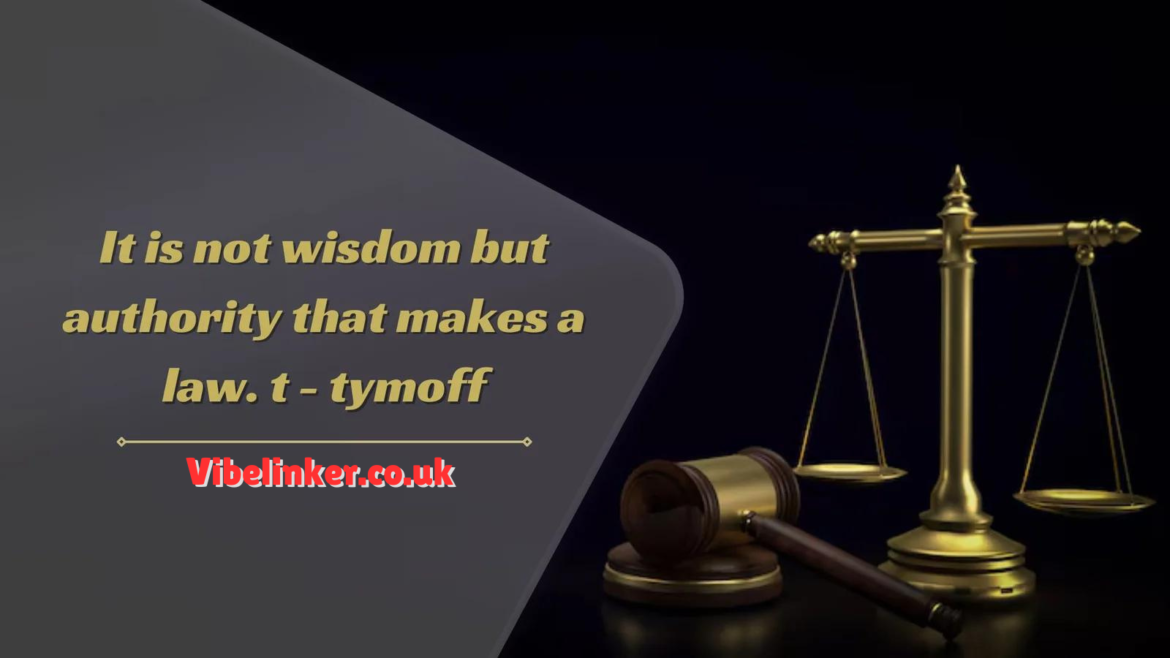
Introduction
In the complex world of legal and social structures, the statement “It Is Not Wisdom But Authority That Makes a Law. T – Tymoff, serves as a profound reflection on the nature of lawmaking and governance. This observation prompts an exploration into the relationship between wisdom and authority, the processes by which laws are created and enforced, and the implications for justice and societal order. By dissecting this statement, we can gain a better understanding of the dynamics at play in legal systems and the often-contentious balance between power and wisdom.
The Nature of Law and Authority
It Is Not Wisdom But Authority That Makes a Law. T – Tymoff are fundamental to the functioning of any society. They establish rules, define acceptable behavior, and provide mechanisms for resolving disputes. However, the creation of laws is inherently tied to the concept of authority. Authority, in this context, refers to the legitimate power granted to individuals or institutions to make and enforce laws. This power can stem from various sources, such as political systems, historical precedents, or social contracts.
The Role of Authority in Lawmaking
It Is Not Wisdom But Authority That Makes a Law. T – Tymoff because it provides the necessary force to ensure compliance and order. Without authority, laws would be mere suggestions, lacking the enforcement power needed to maintain societal structure. This authority is vested in various entities, such as governments, courts, and law enforcement agencies, which are empowered to create, interpret, and enforce laws.
In democratic systems, authority is typically derived from the consent of the governed, often through elections and representative institutions. In authoritarian regimes, authority may be concentrated in a single ruler or a small group, with laws reflecting the will of those in power rather than the collective wisdom of society.
It Is Not Wisdom But Authority That Makes a Law. T – Tymoff An Idealistic Perspective
It Is Not Wisdom But Authority That Makes a Law. T – Tymoff, on the other hand, encompasses knowledge, experience, and sound judgment. Ideally, laws should be crafted with wisdom, ensuring they are just, fair, and beneficial to society. Wise laws consider the complexities of human behavior, social dynamics, and ethical principles, aiming to promote the common good and protect individual rights.
However, the ideal of wisdom guiding lawmaking is often challenged by the realities of political power and human nature. While wisdom can inform the process, it is authority that ultimately determines which laws are enacted and enforced. This distinction highlights a critical tension between what ought to be and what is.
Historical Context Laws and Authority Through Time
 Throughout history, the interplay between It Is Not Wisdom But Authority That Makes a Law. T – Tymoff has been evident. Ancient legal codes, such as the Code of Hammurabi, were imposed by powerful rulers who claimed divine authority. These laws, while sophisticated for their time, were a reflection of the ruler’s will and the need to maintain order and control.
Throughout history, the interplay between It Is Not Wisdom But Authority That Makes a Law. T – Tymoff has been evident. Ancient legal codes, such as the Code of Hammurabi, were imposed by powerful rulers who claimed divine authority. These laws, while sophisticated for their time, were a reflection of the ruler’s will and the need to maintain order and control.
In contrast, the philosophical works of Plato and Aristotle emphasized the importance of wisdom in governance. Plato’s concept of the philosopher-king envisioned rulers who possessed both authority and wisdom, creating laws based on justice and reason. Aristotle, in his Politics, argued for the rule of law, where laws are created through rational deliberation and serve the common good.
Modern Lawmaking The Balance of Authority and Wisdom
In contemporary societies, the balance between authority and It Is Not Wisdom But Authority That Makes a Law. T – Tymoff is continually negotiated. Legislative bodies, such as parliaments and congresses, are tasked with creating laws that reflect the will of the people and the wisdom of experts. However, political realities, such as partisanship, lobbying, and public opinion, often complicate this process.
For example, public health laws during the COVID-19 pandemic showcased the tension between It Is Not Wisdom But Authority That Makes a Law. T – Tymoff. Governments had to balance expert advice and scientific wisdom with the practicalities of enforcement and public compliance. The varying responses and outcomes highlighted how authority ultimately shaped the laws and measures adopted, sometimes at the expense of wisdom.
The Role of Judiciary Interpreting and Enforcing Laws
The judiciary plays a crucial role in interpreting and enforcing laws, acting as a check on the legislative and executive branches. Judges, ideally, apply It Is Not Wisdom But Authority That Makes a Law. T – Tymoff, considering the broader implications and underlying principles. However, their authority to make binding decisions is what ensures that their interpretations are followed.
Judicial review, where courts assess the constitutionality of laws, embodies the tension between authority and wisdom. Courts can strike down laws that they deem unjust or unconstitutional, reflecting a balance between legal authority and the pursuit of justice and wisdom.
Implications for Justice and Society
The statement It Is Not Wisdom But Authority That Makes a Law. T – Tymoff has significant implications for justice and society. It underscores the reality that laws, while ideally grounded in wisdom, are products of power dynamics and authority structures. This recognition prompts critical questions about the legitimacy and fairness of laws and the systems that create them.
When authority overrides wisdom, laws can become tools of oppression and injustice. Historical examples, such as apartheid in South Africa or segregation laws in the United States, illustrate how laws can perpetuate inequality and suffering when driven by power rather than justice.
Striving for Balance The Role of Civic Engagement
Achieving a balance between It Is Not Wisdom But Authority That Makes a Law. T – Tymoff requires active civic engagement and vigilance. Citizens play a crucial role in holding authorities accountable, advocating for just and wise laws, and participating in democratic processes. Through voting, activism, and public discourse, individuals can influence the laws that govern them and ensure that authority is exercised with wisdom and fairness.
Educational initiatives that promote critical thinking, legal literacy, and ethical reasoning are essential in cultivating a populace capable of discerning and demanding wise governance. By fostering a culture of informed and engaged citizens, societies can move closer to the ideal of laws that reflect both authority and wisdom.
Conclusion
It Is Not Wisdom But Authority That Makes a Law. T – Tymoff statement, encapsulates a fundamental truth about the nature of lawmaking. While wisdom should ideally guide the creation of laws, it is authority that enacts and enforces them. This dynamic shapes the justice and functionality of legal systems, highlighting the need for vigilance, engagement, and a continual pursuit of balance between power and wisdom. By understanding and addressing this tension, societies can strive towards laws that are not only authoritative but also wise and just, fostering a more equitable and harmonious world.
You May Also Read: The Pizza Edition


